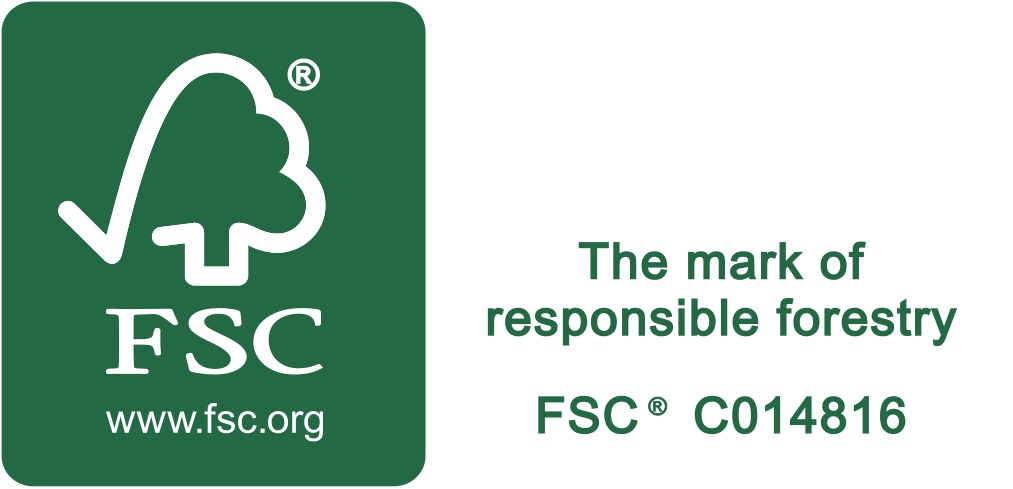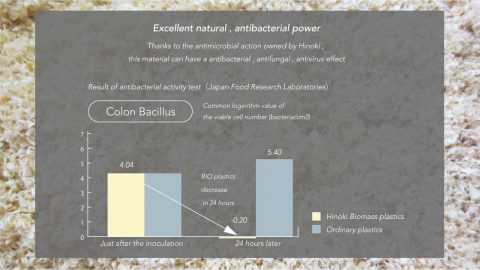Our products are made of Japanese cypress, Japanese cedar, and Sawara cypress, a tree found specifically in Japan. Each tree has various features such as water resistance, antimicrobial effects, calming fragrance, easily workable etc. and we utilize the advantages of each material in our manufacturing. Additionally, because we care about the environment, we use FSC® certified material.
Hinoki (Japanese cypress)
Japanese cypress has a very strong vital force and trees that are several hundred years old still exist in natural forests in Japan. In fact, it has been used as timber for building shrines and temples from old times and it is well known that Horyuji Temple, which is said to be 1,300 years old, is Japanese cypress. This wood is excellent for controlling humidity and preventing mold, and it has antimicrobial and battericidal properties. Its fragrance is said to have a relaxing effect as well. Experience life with Japanese cypress — a wood with many good features.
Sawara (Sawara Cypress)
The Sawara cypress is softer than the Japanese cypress so it is more easily – worked. The strongest feature of it is its resistant to water, so it is used for kitchenware or bath ware such as rice containers, ladles and buckets. Another feature is it does not have strong smell so this wood will not transfer any flavor or smell to foods or water. It has a similar appearance to the Japanese cypress.
Sugi (Japanese cedar)
The Japanese cedar, called Sugi in Japanese, is the tallest and oldest kind of tree in Japan. The highest Japanese cedar is more than 50 meters and the oldest one is about 2 or 3000 years old. Japanese cedar is one of the most popular woods in Japan and has been for a long time. The Japanese cedar can be used for houses, furniture, sculptures, crafts, boats and so on. The features of the Japanese cedar are it is soft and easily – worked. Additionally, the Japanese cedar has great moisture absorbency.
FSC® certificates
In order to protect our natural forests and ensure sustainable forest development and stable timber production, the FSC® certification system facilitates the appropriate management of our forests, the processing and manufacture of timber materials under specific rules, and full traceability of timber materials through the distribution and sale process. By choosing to purchase FSC® products and spreading information about the FSC® certification system, we can all help preserve our natural forests for future generations.

License No. FSC®C014816
Hinoki Biomass Plastic
Biomass is a renewable, organic resource of biological origin and Biomass Plastic is a groundbreaking type of resin made of plant material, which does not depend on fossil fuels. We have developed new Biomass Plastic products, which are partly made with woodchips from Japanese cypress. Japanese companies are currently developing superior material as an alternative to petroleum-derived plastic. In addition, our special method of manufacturing gives our biomass plastic antibacterial and antifungal properties to prevent mold. Since this plastic is made from biological products, we do not need to worry about an oil shortage. Additionally, using biomass plastics decrease CO2 emissions and other harmful effects on the environment.
In recent years, global warming has become an important world wide issue, so we are hoping to make a contribution towards saving the environment.
Characteristic for the eco-friendly resin(Hinoki Biomass Plastic)
1)Antibacterial property
Suppress Bacillus coli, Staphylococcus aureus and mold growth.
2)Heat resistance property
-40℃~+140℃ (-40℉~+284℉)
※Microwavable
※Dishwasher-safe
3) 52% of material are made by eco amd natural material
4)Non emit poisonous gas during combustion
5)Low combustion calorie
5)Over 45% CO2-reduction by compared with the petroleum resins
7)Recyclable and reusable
7)Approved by the Japan Food Sanitation Act for houseware
- Test result
Japanese Lacquer(Urushi)
Japanese lacquer, called Urushi in Japanese, is a natural resin paint, which consists primarily of Urushiol.
Features
1)Natural material
Since Japanese lacquer is made from natural tree sap, it respects the environment-friendly and does not use any harmful chemicals.
2)Antibacterial property
It has a natural antibacterial effect, so it is very hygienic and it can prevent the growth of bacteria.
3)Resistant to acids and alkalis
It has an excellent chemical resistance to acids and alkalis.
It is stain-resistant and easy to care for.
4)Beautiful finish
It has an elegant shiny surface.
5)Long history
Japanese lacquer has a long history, it has been used for more than 5500 years.


